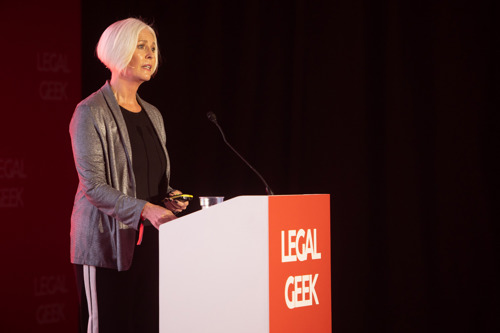Sir Stephen Fry, why solicitors don't need to dig canals, and bionic lawyers — Legal Geek Conference 2025 Report


What do ditch diggers, legal copyists and 20-storey parking structures have in common? They are all examples Sir Stephen Fry used to articulate the future of AI to the great and the good of the law and tech worlds at Legal Geek 2025.
AI is inescapable in conversation right now. Solicitors are talking about it, clients are expecting it, and tech vendors don’t want to sell anything else.
It was no surprise that the Legal Geek 2025 Conference at London’s Old Truman Brewery was dominated by talk of AI adoption. It is, afterall, one of the biggest legal tech events anywhere on the planet attracting legal luminaries and tech providers from far and wide.
But the tenor of those conversations has shifted in the past 24 months. Two years ago, AI and large language models programmes like Chat-GPT were spoken about with scepticism and concern.
Now? Practitioners and leaders in the profession have broadly accepted that AI will be part of legal life and attention has turned to how that is implemented.
'Nobody is suggesting it’s a pity that humans were no longer able to dig canals'
Sir Stephen Fry joined day two of the conference for what must have been its most packed event – a fireside chat during which the national treasure took the hands of the audience and led them through a discussion his experiences with bipolar disorder, the rise and fall of social media, Greek myths and the importance of the hearth in human connection.
The audience was rapt, and he brought the session to the matter of industrial revolution, AI and a lawyer’s place in the change.
“With law, we’re finding that language is being treated like dirt and earth was in the 18th century,” Fry said. “When the industrial revolution happened, Birmingham has all these wonderful foundries making incredible things with the power of steam.
“The railways were at least 50 years away, so canals need to be dug. That’s the only way you can move everything around. And how do you dig a canal? You need a human and a spade.
“There was no other way to do it. Incredibly back-breaking work. An extraordinary effort. Then in the 1820s somebody invented the steam shovel, which has become the JCB digger. And nobody is suggesting it’s a pity that humans were no longer able to dig canals.
“That’s physical labour, but the mental labour of sorting facts, digging facts, digging, retrieving, ordinating, filing and re-retrieving and filing again and re-retrieving and synthesising and putting back is just the same, only it’s for the mind.
“It isn’t the greatest thing a human being can do. It’s clerical, that’s the word. It’s Bob Cratchit in Christmas Carol. It’s not very dignified work.
“This whole area of London and further west in the legal district there were hundreds of legal copyists. It was a special profession, just simply writing out. All they did, writing out. We have printers now, nobody says ‘oh what happened to the legal copyists’. It’s about getting used to the fact that the work – a lot of the work – is what computers can do extremely well.”
Fry, who famously starred in Blackadder and Jeeves and Wooster and who has made an appearance in The Celebrity Traitors which is currently airing, then took the audience – who had spent the proceeding sessions considering into the future – back to Karl Benz’ first engine, and the notion that no one who saw that strange machine could have predicted “20-storey parking structures, freeways, garages and the entire way of working and commuting and living according to this strange machine.” And yet that is what happened.
‘Rivers full of raw sewage’
But whilst Fry was ebullient and evocative about the promise AI and machine learning holds, and of the inevitability and excitement of change, he did caveat his thoughts with one major concern: the technocrats.
“My objection with AI is that the people in charge of it at the moment are the same people who have been in charge and given us social media knowing, for example, the destructive nature of it. Knowing what it does to reduce truthful and honest and proper human intercourse and how contaminated and polluted the rivers of our discourse are. They are like our rivers in Britain, they are just full of raw sewage and they make money as a result. And the money is all that matters.”
The actor condemned tech oligarchs as anti-institutionalists who threaten society and democracy, and added, scathingly, that it appears lost on the billionaire disruptor class that the word ‘disrupt’ itself is rooted in the Latin for ‘break apart’.
Elsewhere at Legal Geek 2025
The two-day event, which attracted in the region of 4,500 attendees to the sprawling brewery site, also featured on its billing names including Helle Thorning-Schmidt (Former Prime Minister of Denmark), Sarah Sackman KC MP (Minister of State for Courts and Legal Services), Sir Geoffrey Vos (Master of the Rolls and Head of Civil Justice for England and Wales), and Baroness Helena Kennedy.
Gordon Crenshaw, partner at the LegalTech Fund, led a session about where capital is being invested in the sector and noted that recent figures suggest 90 per cent of employees are using AI for work but not disclosing it, pointing towards hidden adoption.
Crenshaw also introduced the term ‘bionic lawyer’, which he said is a combination of legal expertise, data understanding and technological savvy. Discussions of legal engineers and other new roles within firms formed a part of the conference overall.
Ian Spain, head of legal at Vanta, walked attendees through examples of how his team use existing AI and other new software in-house at the compliance giant. He gave the example of a SlackBot his team has implemented to field repeated and regular questions from staff in the wider company, set up to refer to internal documents.
And Christina Blacklaws, chair of Lawtech UK and former president of the Law Society of England and Wales rounded off the event with an impassioned speech about the importance of using new technology to address the access to justice crisis.

She said: “It’s an addressable problem with imagination, rigorous design and a commitment to help and a commitment to fairness. Lawtech can covert unmet legal need into resolved problems.
“Let us commit today to design technology for people first, insist on measurable fairness, and scale with partners who know the lived realities of limited legal means. The future of justice is not a distant ideal. It’s a set of design choices we make right now. Let’s design those choices well.”











